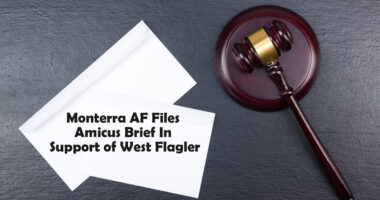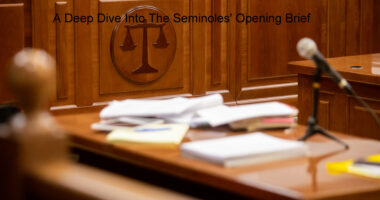Skip to content

In the Florida sports betting appeal, last week was the deadline to file amicus curiae briefs supporting the plaintiff.
The D.C. Court of Appeals mandated those filing in support of West Flagler Associates must be submitted by Oct. 13. The case at hand holds the future of the 2021 Florida gaming compact that briefly legalized sports betting last year. However, a U.S. District Court judge ruled in favor of West Flagler that the compact violated federal standards.
West Flagler filed suit against the Department of the Interior Secretary Deb Haaland, who approved the compact. And while the federal government picked up a couple of briefs in support of its arguments, West Flagler got one.
Not that the number of briefs means anything, but the group that filed an amicus curiae brief was Monterra AF. The group represented an anti-gambling coalition called No Casinos and was a plaintiff in its own lawsuit against the compact.
West Flagler argued against the sports betting provisions in the agreement, but the deal also allowed casinos owned by the Seminole Tribe to expand their offerings to include games like craps and roulette. Monterra argued that this violated Amendment 3, a 2018 ballot initiative that said all gaming expansion must be voted on.
But District Court Judge Dabney Friedrich only ruled on the West Flagler lawsuit. Since she already invalidated the compact, she felt no need to rule on Monterra’s suit.
Where do things currently stand with the Florida gaming compact?
Both the federal government and West Flagler Associates have filed their initial briefs in the appeal. West Flagler wants to uphold Friedrich’s ruling that the 2021 compact violates the Indian Gaming Regulatory Act. On the other hand, the feds hope to overturn it.
There were also a handful of amicus briefs filed as well. The Seminole Tribe was part of a larger amicus brief in support of the government. They also filed a separate motion appealing the district court’s decision to prohibit the tribe from intervening.
If the Seminoles are allowed to intervene, they will push for a dismissal based on sovereign immunity grounds. Most legal minds believe they would be successful in that action.
The federal government and the Seminole Tribe are next up. They both must file their answering briefs to West Flagler and Monterra by Nov. 14.
A deeper look at the Monterra brief
The brief raises three substantive arguments in favor of upholding the district court’s decision. Those arguments are against both in favor of the invalidity of the compact, and the tribe’s intervention aspirations.
The 2021 compact breaks all the rules
The first argument states the compact violates the IGRA by “unlawfully circumventing Florida gaming law.” The crux is that the federal government’s position that they lack an affirmative obligation to reject compacts is false. If that is the case, the DOI’s review effectively becomes a “meaningless rubber stamp.”
Monterra argues that it is the federal government’s job to review compacts for compliance with the IGRA. Therefore, it must ensure that a compact is lawful under state law before approval. Specifically, they aim for the DOI’s statement in its opening brief.
“Even a [compact] provision that squarely conflicts with existing… state law would not violate IGRA itself (emphasis removed).”
The brief notes that the provision appears to conflict with IGRA’s requirement that a gaming activity “shall ‘only’ be lawful if lawful in the state.”
It harkens back to West Flagler’s argument that the compact authorized activities that were not lawful in Florida.
Votes Matter
The brief then argues that Amendment 3 renders it impossible to expand gaming without the voters’ approval. It then argues that the 2021 compact was an attempted run-around of the 2018 constitutional amendment.
Then it contends that many states have the authority to allow gaming on lands within the state. But that is not the case in the Sunshine State.
“That may be true in other states, but it does not hold true in Florida, as Floridians chose to remove that power from the Florida legislature and vested it exclusively with the voters…”
Missed something
Monterra then added issues that West Flagler didn’t even raise. They argued there are even more ways that the deal violated the IGRA.
Notably, the brief states that the component of the compact that allowed for partnerships with pari-mutuel facilities is incompatible with the law. Since its intent “enriches non-Tribal entities,” it violates the IGRA.
No need for the Seminole Tribe
Towards the end of their argument, the group argues that the District Court was correct in banning Seminole intervention. Mostly because of Amendment 3.
Since the 2018 constitutional amendment requires voter approval for gaming expansion, there is no need for tribal intervention. Moreover, nobody can have an interest in protecting unlawful gaming. Therefore, intervention is not necessary.
Throw it all out
Finally, the brief argues that the proper remedy is the vacatur of the entire compact. In other words, the brief asks the D.C. Court of Appeals to uphold the District Court’s ruling by throwing out the entire agreement.
There is a presumption that unconstitutional or unlawful parts of a statute or agreement can be severed. But the District Court ruled that the infringing portions of it were a central reason for the compact’s creation. As a result, the court decided those parts couldn’t be separated and the whole compact should be thrown out.
What to make of this brief?
The brief takes an interesting approach by focusing on the 2018 ballot initiative for its basis of rejecting the compact. The now-constitutional amendment has not been the focus of the case. However, it has periodically been mentioned.
Amicus briefs are historically a bit of a mixed bag in terms of influence, this one raises differentiated arguments from the other parties. These new arguments may pique the interest of a judge on the panel.
Photo by Shutterstock.com




